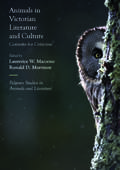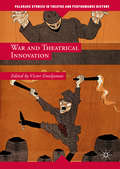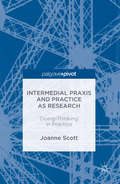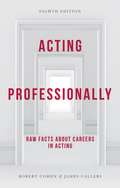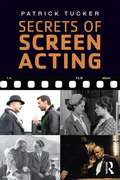- Table View
- List View
Animals in Victorian Literature and Culture: Contexts for Criticism (Palgrave Studies in Animals and Literature)
by Laurence W. Mazzeno Ronald D. MorrisonThis collection includes twelve provocative essays from a diverse group of international scholars, who utilize a range of interdisciplinary approaches to analyze "real" and "representational" animals that stand out as culturally significant to Victorian literature and culture. Essays focus on a wide range of canonical and non-canonical Victorian writers, including Charles Dickens, Anthony Trollope, Anna Sewell, Emily Bronte, James Thomson, Christina Rossetti, and Richard Marsh, and they focus on a diverse array of forms: fiction, poetry, journalism, and letters. These essays consider a wide range of cultural attitudes and literary treatments of animals in the Victorian Age, including the development of the animal protection movement, the importation of animals from the expanding Empire, the acclimatization of British animals in other countries, and the problems associated with increasing pet ownership. The collection also includes an Introduction co-written by the editors and Suggestions for Further Study, and will prove of interest to scholars and students across the multiple disciplines which comprise Animal Studies.
War and Theatrical Innovation
by Victor EmeljanowThis book examines the relationship between wartime conflict and theatre practices. Bringing together a diverse collection of essays in one volume, it offers both a geographically and historically wide view of the subject, taking examples from Britain, Australia and America to the Middle East, Korea and China, and spanning the fifth century BCE to the present day. It explores the ways in which theatre practices have been manipulated for use in political and military propaganda, such as the employment of scenographers to work on camouflage and the application of acting methods in espionage training. It also maps the change in relationships between performers and audiences as a result of conflict, and the emergence of new forms of patronage during wartime theatre-going, boosting morale at periods when social structures and identity were being destabilized.
Intermedial Praxis and Practice as Research
by Joanne ScottIn this book, Jo Scott shares writing and documentation from her practice as research (PaR) project, which explored and analysed a mode of performance she developed, called live intermediality. The book offers a much-needed example of fully developed writing in relation to a practice as research (PaR) project. Weaving together theory, documentation and critical reflection, it offers fresh insights into both the process and presentation of PaR work, as well as theories around intermediality in performance, the role and actions of the live media performer and how live media events are created. It can be read alongside Robin Nelson's 2013 text, Practice as Research in the Arts, as it demonstrates how Nelson's model for PaR can be applied and developed. It also includes a set of online videos and commentaries, which complement and reflect on the writing in the core text.
Acting Professionally (8th Edition)
by Robert Cohen James CalleriThis vital resource will steer you through the hugely competitive industry of stage, film and TV acting, offering wise advice on everything from writing an eye-catching résumé to finding an agent. It will give you a clear understanding of how acting careers are built and sustained, and how actors must position themselves in an environment overseen by directors, agents, casting directors and acting unions. Praised for its honest and critical understanding of the industry, the text has retained its status as the leading book in its field since the first edition published in 1972. Acclaimed industry professional authors Robert Cohen and James Calleri offer vast insight and experience as professors, directors, playwrights and casting directors, making the text essential reading for all students and lecturers of Acting at universities, drama schools and conservatories, as well as anyone interested in pursuing and developing their career in acting.
Secrets of Screen Acting Third Edition
by Patrick TuckerWhen it was first published in 1993, Secrets of Screen Acting broke new ground in explaining how acting for the camera is different from acting on stage. Reaction time is altered, physical timing and placement are reconceived, and the proportions of the digital frame itself become the measure of all things, so the director must conceptualize each image in terms of this new rectangle and actors must 'fit' into the frame. Based on a revolutionary non-Method approach to acting, this book shows what actually works: how an actor, an announcer--anyone working in front of the cameras--gives excellent performances on screen.
Sophocles' Antigone
by Diane J. RayorSophocles' Antigone comes alive in this new translation that will be useful for academic study and stage production. Diane Rayor's accurate yet accessible translation reflects the play's inherent theatricality. She provides an analytical introduction and comprehensive notes, and the edition includes an essay by director Karen Libman. Antigone begins after Oedipus and Jocasta's sons have killed each other in battle over the kingship. The new king, Kreon, decrees that the brother who attacked with a foreign army remain unburied and promises death to anyone who defies him. The play centers on Antigone's refusal to obey Kreon's law and Kreon's refusal to allow her brother's burial. Each acts on principle colored by gender, personality and family history. Antigone poses a conflict between passionate characters whose extreme stances leave no room for compromise. The highly charged struggle between the individual and the state has powerful implications for ethical and political situations today.
Aristophanes and the Poetics of Competition
by Zachary P. BilesAthenian comic drama was written for performance at festivals honouring the god Dionysos. Through dramatic action and open discourse, poets sought to engage their rivals and impress the audience, all in an effort to obtain victory in the competitions. This book uses that competitive performance context as an interpretive framework within which to understand the thematic interests shaping the plots and poetic quality of Aristophanes' plays in particular, and of Old Comedy in general. Studying five individual plays from the Aristophanic corpus as well as fragments of other comic poets, it reveals the competitive poetics distinctive to each. It also traces thematic connections with other poetic traditions, especially epic, lyric, and tragedy, and thereby seeks to place competitive poetics within broader trends in Greek literature.
Sophocles
by P. J. FinglassSophocles' Ajax describes the fall of a mighty warrior denied the honour which he believed was his due. This new edition of the play presents a text and critical apparatus which take full advantage of recent advances in our understanding of Sophoclean manuscripts and scholarship. The introduction and commentary scrutinise all important aspects of the drama - from detailed analysis of style, language and metre to consideration of wider issues such as ethics, rhetoric and characterisation. Notorious dramaturgical problems, including the staging of Ajax's suicide, receive particular attention; so too do questions of literary history, such as the date of the play and Sophocles' creative interaction with previous accounts of the myth. The translation which accompanies the commentary ensures that this edition will be accessible to Hellenists of all levels of experience, as well as to readers with a general interest in the history of drama.
Shakespeare, Rhetoric and Cognition
by Raphael LyneRaphael Lyne addresses a crucial Shakespearean question: why do characters in the grip of emotional crises deliver such extraordinarily beautiful and ambitious speeches? How do they manage to be so inventive when they are perplexed? Their dense, complex, articulate speeches at intensely dramatic moments are often seen as psychological - they uncover and investigate inwardness, character and motivation - and as rhetorical - they involve heightened language, deploying recognisable techniques. Focusing on A Midsummer Night's Dream, Othello, Cymbeline and the Sonnets, Lyne explores both the psychological and rhetorical elements of Shakespeare's language. In the light of cognitive linguistics and cognitive literary theory he shows how Renaissance rhetoric could be considered a kind of cognitive science, an attempt to map out the patterns of thinking. His study reveals how Shakespeare's metaphors and similes work to think, interpret and resolve, and how their struggle to do so results in extraordinary poetry.
Performing Oaths in Classical Greek Drama
by Judith FletcherOaths were ubiquitous rituals in ancient Athenian legal, commercial, civic and international spheres. Their importance is reflected by the fact that much of surviving Greek drama features a formal oath sworn before the audience. This is the first comprehensive study of that phenomenon. The book explores how the oath can mark or structure a dramatic plot, at times compelling characters like Euripides' Hippolytus to act contrary to their best interests. It demonstrates how dramatic oaths resonate with oath rituals familiar to the Athenian audiences. Aristophanes' Lysistrata and her accomplices, for example, swear an oath that blends protocols of international treaties with priestesses' vows of sexual abstinence. By employing the principles of speech act theory, this book examines how the performative power of the dramatic oath can mirror the status quo, but also disturb categories of gender, social status and civic identity in ways that redistribute and confound social authority.
Tragic Pathos
by Dana Lacourse MunteanuScholars have often focused on understanding Aristotle's poetic theory, and particularly the concept of catharsis in the Poetics, as a response to Plato's critique of pity in the Republic. However, this book shows that, while Greek thinkers all acknowledge pity and some form of fear as responses to tragedy, each assumes a different purpose for the two emotions and mode of presentation and, to a degree, understanding of them. This book reassesses expressions of the emotions within different tragedies and explores emotional responses to and discussions of the tragedies by contemporary philosophers, providing insights into the ethical and social implications of the emotions.
Theatre and Testimony in Shakespeare'S England
by Holger Schott SymeHolger Syme presents a radically new explanation for the theatre's importance in Shakespeare's time. He portrays early modern England as a culture of mediation, dominated by transactions in which one person stood in for another, giving voice to absent speakers or bringing past events to life. No art form related more immediately to this culture than the theatre. Arguing against the influential view that the period underwent a crisis of representation, Syme draws upon extensive archival research in the fields of law, demonology, historiography and science to trace a pervasive conviction that testimony and report, delivered by properly authorised figures, provided access to truth. Through detailed close readings of plays by Ben Jonson and William Shakespeare – in particular Volpone, Richard II and The Winter's Tale – and analyses of criminal trial procedures, the book constructs a revisionist account of the nature of representation on the early modern stage.
Performing Greek Comedy
by Alan HughesAlan Hughes presents a new complete account of production methods in Greek comedy. The book summarizes contemporary research and disputes, on such topics as acting techniques, theater buildings, masks and costumes, music and the chorus. Evidence is re-interpreted and traditional doctrine overthrown. Comedy is presented as the pan-Hellenic, visual art of theater, not as Athenian literature. Recent discoveries in visual evidence are used to stimulate significant historical revisions. The author has directly examined 350 vase scenes of comedy in performance and actor-figurines, in 75 collections, from Melbourne to St Petersburg. Their testimony is applied to acting techniques and costumes, and women's participation in comedy and mime. The chapters are arranged by topic, for convenient reference by scholars and students of theater history, literature, classics and drama. Overall, the book provides a fresh practical insight into this continually developing subject.
Sexual Politics in the Work of Tennessee Williams
by Michael S. D. HooperMichael S. D. Hooper reverses the recent trend of regarding Tennessee Williams as fundamentally a social writer following the discovery, publication and/or performance of plays from both ends of his career – the 'proletarian' apprentice years of Candles to the Sun and Not About Nightingales and the once overlooked final period of, amongst many other plays, The Red Devil Battery Sign. Hooper contends that recent criticism has exaggerated the political engagement and egalitarian credentials of a writer whose characters and situations revert to a reactionary politics of the individual dominated by the negotiation of sexual power. Directly, or more often indirectly, Williams' writing expresses social disaffection before glamorising the outcast and shelving thoughts of political change. Through detailed analysis of canonical texts the book sheds new light on Williams' work, as well as on the cultural and social life of mid-twentieth-century America.
Greek Tragic Style
by R. B. RutherfordGreek tragedy is widely read and performed, but outside the commentary tradition detailed study of the poetic style and language of Aeschylus, Sophocles and Euripides has been relatively neglected. This book seeks to fill that gap by providing an account of the poetics of the tragic genre. The author describes the varied handling of spoken dialogue and of lyric song; major topics such as vocabulary, rhetoric and imagery are considered in detail and illustrated from a broad range of plays. The contribution of the chorus to the dramas is also discussed. Characterisation, irony and generalising statements are treated in separate chapters and these topics are illuminated by comparisons which show not only what is shared by the three major dramatists but also what distinguishes their practice. The book sheds light both on the genre as a whole and on many particular passages.
When Heroes Sing
by Sarah NooterThis book examines the lyrical voice of Sophocles' heroes and argues that their identities are grounded in poetic identity and power. It begins by looking at how voice can be distinguished in Greek tragedy and by exploring ways that the language of tragedy was influenced by other kinds of poetry in late fifth-century Athens. In subsequent chapters, Professor Nooter undertakes close readings of Sophocles' plays to show how the voice of each hero is inflected by song and other markers of lyric poetry. She then argues that the heroes' lyrical voices set them apart from their communities and lend them the authority and abilities of poets. Close analysis of the Greek texts is supplemented by translations and discussions of poetic features more generally, such as apostrophe and address. This study offers new insight into the ways that Sophoclean tragedy inherits and refracts the traditions of other poetic genres.
Slaves and Slavery in Ancient Greek Comic Drama
by Ben Akrigg Rob TordoffHow did audiences of ancient Greek comedy react to the spectacle of masters and slaves? If they were expected to laugh at a slave threatened with a beating by his master at one moment but laugh with him when they bantered familiarly at the next, what does this tell us about ancient Greek slavery? This volume presents ten essays by leading specialists in ancient Greek literature, culture and history, exploring the changing roles and representations of slaves in comic drama from Aristophanes at the height of the Athenian Empire to the New Comedy of Menander and the Hellenistic World. The contributors focus variously on individual comic dramas or on particular historical periods, analysing a wide range of textual, material-culture and comparative data for the practices of slavery and their representation on the ancient Greek comic stage.
Harrison Birtwistle's Operas and Music Theatre
by David BeardDavid Beard presents the first definitive survey of Harrison Birtwistle's music for the opera house and theatre, from his smaller-scale works, such as Down by the Greenwood Side and Bow Down, to the full-length operas, such as Punch and Judy, The Mask of Orpheus and Gawain. Blending source study with both music analysis and cultural criticism, the book focuses on the sometimes tense but always revealing relationship between abstract musical processes and the practical demands of narrative drama, while touching on theories of parody, narrative, pastoral, film, the body and community. Each stage work is considered in terms of its own specific musico-dramatic themes, revealing how compositional scheme and dramatic conception are intertwined from the earliest stages of a project's genesis. The study draws on a substantial body of previously undocumented primary sources and goes beyond previous studies of the composer's output to include works unveiled from 2000 onwards.
Professing Performance
by Shannon JacksonToday's academic discourse is filled with the word 'perform'. Nestled amongst a variety of prefixes and suffixes (re-, post-, -ance, -ivity?), the term functions as a vehicle for a host of contemporary inquiries. For students, artists, and scholars of performance and theatre, this development is intriguing and complex. By examining the history of theatre studies and related institutions and by comparing the very different disciplinary interpretations and developments that led to this engagement, Professing Performance offers ways of placing performance theory and performance studies in context. This 2004 book considers the connection amongst a range of performance forms such as oratory, theatre, dance, and performance art and explores performance as both a humanistic and technical field of education. Throughout, she explores the institutional history of performance in the US academy in order to revise current debates around the role of the arts and humanities in higher education.
Performance and Identity in the Classical World
by Anne DuncanActors in the classical world were often viewed as frauds and impostors, capable of deliberately fabricating their identities. Conversely, they were sometimes viewed as possessed by the characters that they played, or as merely playing themselves onstage. Numerous sources reveal an uneasy fascination with actors and acting, from the writings of elite intellectuals (philosophers, orators, biographers, historians) to the abundant theatrical anecdotes that can be read as a body of "popular performance theory. " This study examines these sources, along with dramatic texts and addresses the issue of impersonation, from the late fifth century BCE to the early Roman Empire.
Found in Translation
by J. Michael WaltonIn considering the practice and theory of translating plays into English from Classical Greek from a theatrical perspective, Found in Translation also addresses wider issues of transferring any piece of theatre from a source into a target language. The history of translating classical tragedy and comedy, here fully investigated for the first time, demonstrates how through the ages translators have, wittingly or unwittingly, appropriated Greek plays and made them reflect socio-political concerns of their own era. Chapters are devoted to topics including verse and prose, mask and non-verbal language, stage directions and subtext and translating the comic. Among the plays discussed as 'case studies' are Aeschylus' Agamemnon, Sophocles' Oedipus Tyrannus and Euripides' Medea and Alcestis. The book concludes with a consideration of the boundaries between 'translation' and 'adaptation', followed by an Appendix of every translation of Greek tragedy and comedy into English from the 1550s to the present day.
Hamlet (The New Cambridge Shakespeare)
by William ShakespearePhilip Edwards deals succinctly with the exhaustive commentary and controversy which Hamlet has provoked in the manifestation of its tragic energy. Robert Hapgood has contributed a new section on prevailing critical and performance approaches to the play in this updated edition. He discusses recent film and stage performances and actors of the Hamlet role as well as directors of the play. His account of new scholarship stresses the role of memory in the play and the impact of feminist and performance studies upon it. [This text is listed as an example that meets Common Core Standards in English language arts in grades 11-12 at http://www.corestandards.org.]
The Cambridge Companion to Ibsen
by James McfarlaneIn the history of modern theatre, Ibsen is one of the dominating figures. The sixteen chapters of this 1994 Companion explore his life and work, providing an invaluable reference work for students. In chronological terms they range from an account of Ibsen's earliest pieces, through the years of rich experimentation, to the mature 'Ibsenist' plays that made him famous towards the end of the nineteenth century. Among the thematic topics are discussions of Ibsen's comedy, realism, lyric poetry and feminism. Substantial chapters account for Ibsen's influence on the international stage and his challenge to theatre and film directors and playwrights today. Essential reference materials include a full chronology, list of works and essays on twentieth-century criticism and further reading.
The Cambridge Companion to Eugene O'Neill
by Michael ManheimThis volume of specially commissioned essays contains studies of O'Neill's life, his intellectual and creative forebears, and his relation to the theatrical world of his creative period, 1916-1942. Also included are descriptions of the O'Neill canon and its production history on stage and screen, and a series of essays on "special topics" related to the playwright. One of the essays speaks for those who are critical of O'Neill's work, and the volume concludes with an essay on O'Neill criticism containing a select bibliography of full-length studies of the playwright's work.
The Cambridge Companion to George Bernard Shaw
by Christopher InnesThe Cambridge Companion to George Bernard Shaw is an indispensable guide to one of the most influential and important dramatists of the theatre. The volume offers a broad-ranging study of Shaw with essays by a team of leading scholars. The Companion covers all aspects of Shaw's drama, focusing on both the political and theatrical context, while the extensive illustrations showcase productions from the Shaw Festival in Canada. In addition to situating Shaw's work in its own time, the Companion demonstrates its continuing relevance, and applies some of the newest critical approaches. Topics include Shaw and the publishing trade, Shaw and feminism, and Shaw and the Empire, as well as analyses of the early plays, discussion plays and history plays.
